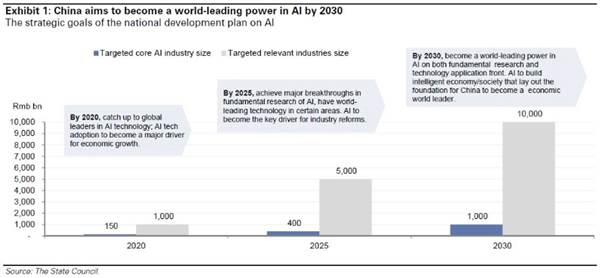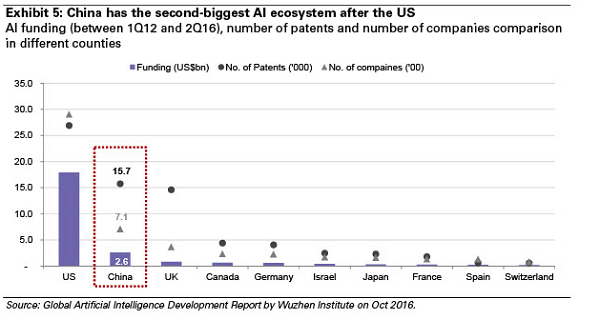Nothing artificial about this smart investment theme
20th October 2017 11:08
by Emil Ahmad from interactive investor
Share on
It could be described as the Space Race of the new millennium; it certainly shares many similarities - a two- horse race between global leaders with lofty ambitions of trying to achieve the impossible. In the same way that putting a man on the moon seemed beyond comprehension only 60 years ago, could we have realistically envisioned self-driving cars or virtual agents a decade ago?
This time, Russia has been replaced by China as America's would-be heir to technological supremacy. However, a fundamental difference to this contest is that the stakes are far higher.
While the Space Race was arguably motivated by politics as much as by scientific dominance, the battle for Artificial Intelligence (AI) has a greater prize for the victor: leadership of the Fourth Industrial Revolution.
As the US and China jostle for position, Beijing has clearly laid its cards on the table, with an apparent blueprint for success; 'A Next Generation Artificial Intelligence Development Plan'.
This July 2017 AI 'manifesto' sees Beijing vowing to "vigorously use governmental and social capital" to dominate the burgeoning sector. Ambition of this scale has been reinforced by impressive numbers, fundamentally the creation of a $150 billion industry by 2030.

Tale of the tape
China may have to play a game of catch up, but it undeniably has resources to give the US a run for its money. Although China has yet to set the AI world alight in self-driving cars or semiconductors, it comfortably occupies second spot in terms of AI infrastructure.
According to 2016 research from the Wuzhen Institute, there are around 700 Chinese AI companies compared with approaching 3,000 in the US. Chinese patents granted exceeds 15,000, more than half of the equivalent US figure.
As the National Science Foundation in the US gets no extra funding in 2017, it may appear American AI is stagnant while Chinese investment accelerates. In any case, with a $150 billion Chinese 'commitment', the gap between the two AI ecosystems is on a converging path.

A question of size and privacy
Size is not everything, but in China's case it might be. The simple demographics arguably put China at an irrepressible advantage as the battle to become the AI superpower gathers momentum.
If the foundation of AI is data processing, then the world's most populous country has the numbers that count. At a population of 1.4 billion and growing, Beijing effectively has an infinite resource to draw upon for data processing. At the technology end of the spectrum, America's 'connected' population is just over 50% of China's 730 million equivalent and far less knowledgeable.
Commenting in the Financial Times, an industry insider recently highlighted China's mobile use as setting global precedents, noting, "…you have a huge experimental lab for exciting AI applications. In China we see different consumer behaviours every day, in the US it's a lot slower."
Politics and citizens' expectations play a part too. America's fully-fledged democracy places more obstacles in the way regarding 'breaching' people's privacy which can hinder progress. Anthony Mullen, a director of research at analyst firm Gartner, recognises this distinction as a form of "citizen-centric legislation." In his comments to The Verge, Mullen noted that China is far less reticent when it comes to utilising private data and this can only enhance the development of AI infrastructure.
While Chinese companies may effectively be able to bypass this privacy matter on some level, and do not have this luxury and must develop workarounds. In consequence, AI may be deployed in ways which may not be permissible in the West. For example, facial recognition technology in China has been adopted in matters as diverse as identifying jaywalkers to supplying toilet paper!
While these practical applications of technology may seem insignificant, the benefits of 'real-life' testing and development cannot be underestimated. As Mullen concludes, "I don't think China will have the same level of existential crisis about the development of AI that the West will have."
Protecting one's interests
While money seems no obstacle for Beijing, the Trump administration appears not to be pro-science. The proposed budget for 2018 would deeply reduce funding for research, thus adversely affecting agencies whose work may advance AI.
Considering this disruptive sector has hugely significant military as well as civil usages, it is surprising that this is a risk Trump can justify taking. With protectionism such a key element of Trump rhetoric, losing ground to China in developing AI military applications could make the US more vulnerable from a national security perspective.
If Trump is ignoring the obvious, China is paying attention. As the July AI paper stated, China intends to "…take the development of AI to the national strategic level...firmly seize the strategic initiative in the new stage of international competition in AI development, to create new competitive advantage, opening up the development of new space, and effectively protecting national security."
If the president is not prepared to match Chinese investment in AI, he is certainly prepared to protect existing US interests. The focus will be directed towards greater scrutiny of Chinese investment in US, thus safeguarding access to sensitive technologies integral to national security.
By bolstering the power of the Committee on Foreign Investment in the United States (CFIUS), foreign acquisitions with potential national security implications will come under far more scrutiny. Reuters gained access to an associated Pentagon report in June this year, which suggests China is circumventing US attention by entering into transactions which do not presently prompt CFIUS review.
While this enhanced 'due diligence' may not please markets or enhance M&A activity, it may help Washington get a better night's sleep. Beijing is naturally keen to downplay such matters, with Foreign Ministry spokesman Lu Kang stating that such investments should not be "politically over-interpreted". However, estimates by Rhodium Group that the US is the largest beneficiary of Chinese foreign direct investment in 2016 ($45.6 billion) will not reassure Trump.
The British take on technology
While the US and China brace themselves for battle, the UK is not standing still. The Wuzhen Institute ranked the UK a clear third in 2016 as regards AI ecosystems. The number of patents granted almost matched China's total of 15,700, three times the level of the UK's next closest competitor.
Notwithstanding Brexit, the fact that the UK is on such firm footing already ensures it is in prime position to capitalise on a global AI explosion.
Reacting to the third annual Tech Nation report earlier this year, Theresa May described the IT sector as a "great British success story". Tech Nation revealed that the UK led Europe in attracting technology investment between 2011-2016. Having enjoyed tech inflows of £28 billion over this period, the efforts of France (£11 billion) and Germany (£9.3 billion) paled in comparison. Furthermore, with the digital economy growing twice as fast as GDP, it expanded by 30% over the same timeframe.
It would stand to economic reason that the UK government is keen to promote such a disruptive sector. Research from Accenture last year estimated that AI could add approximately £654 billion to the UK economy by 2035.
To this end, the UK government has made AI development a core component of its future digital strategy. The government has already pledged to support the UK IT sector with a £4.7 billion R&D fund, as it seeks to further enhance its AI credentials in the coming years.
Speaking at Microsoft Future Decoded in London last year, Chancellor Phillip Hammond believes technology can "futureproof" Britain, recognising that "…there is a once in generation chance to take the lead in innovation".
For a sector characterised by disruption and boundless possibilities, the battle to become the AI leader will likely follow a similarly unpredictable path. The US may have a head start with its Silicon Valley stronghold, but China has made its intentions clear.
What we do know is that America will respond to this challenge, and a rebooted CFIUS is just the beginning. The race for AI supremacy could prove just as exciting as the innovation that drives it.
This article is for information and discussion purposes only and does not form a recommendation to invest or otherwise. The value of an investment may fall. The investments referred to in this article may not be suitable for all investors, and if in doubt, an investor should seek advice from a qualified investment adviser.